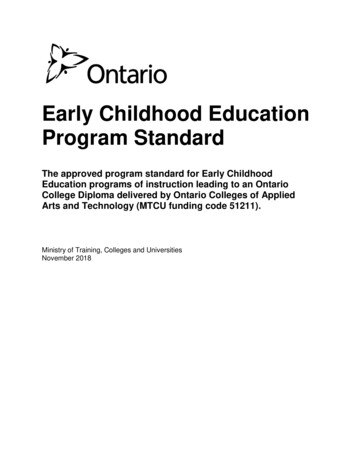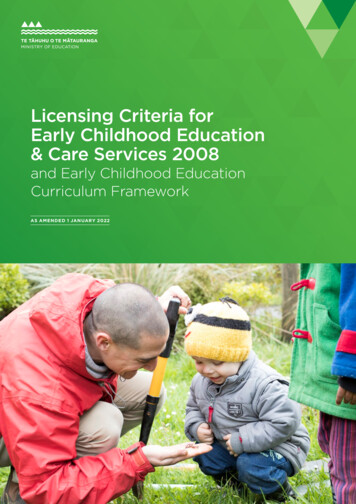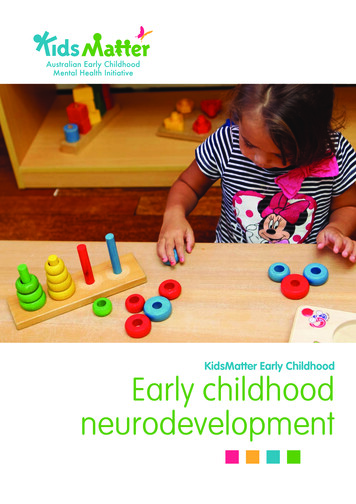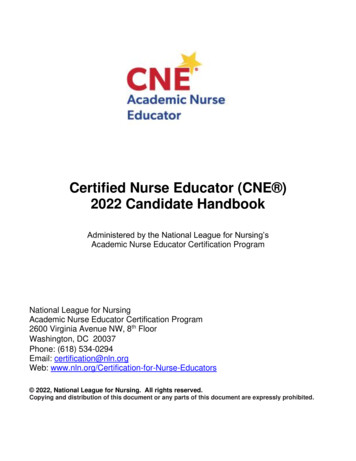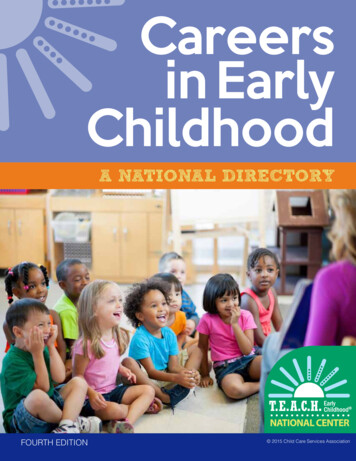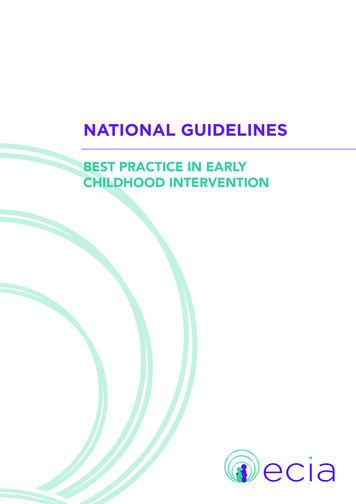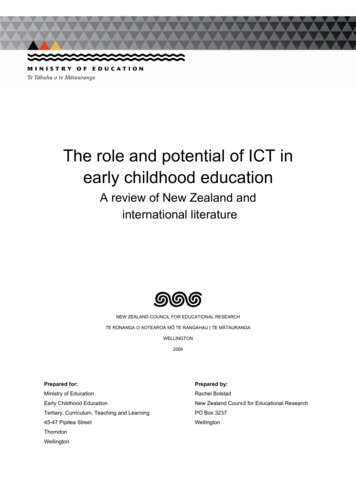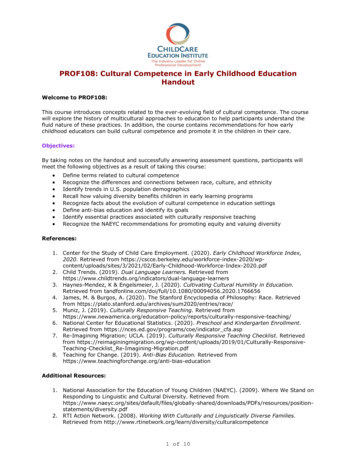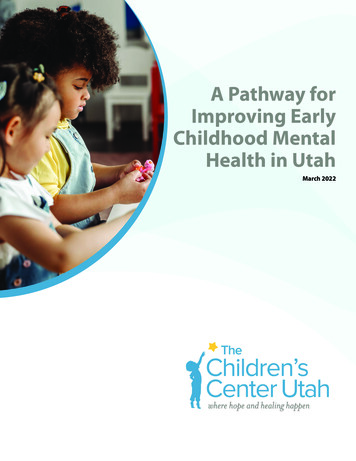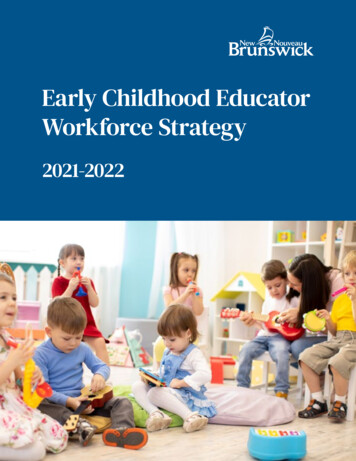
Transcription
Early Childhood EducatorWorkforce Strategy2021-2022
Early Childhood Educator Workforce Strategy 2021-2022Published by the Department of Education and Early Childhood DevelopmentProvince of New BrunswickP.O. Box 6000Fredericton NB E3B 5H1September 2021ISBN 978-1-4605-2955-3 (PDF Edition)13425
In the “Everyone at their best from the start”New Brunswick envisioned an early learning andchild care system of high quality that families canrely on and where every child receives appropriateservices enabling them to reach their full potential.The success of the New Brunswick Early LearningCentre designation provides a strong foundationfor the continued transformation of NewBrunswick’s early learning and child care system.New Brunswick’s overarching goal is to createa culture of continuous quality improvement,whereby operators and educators are activelyengaged in the process to move beyond theminimum legislative requirements.Every day, early childhood educators shape thelearning environments for children. As an educator,understanding how children learn is critical tosupporting children’s overall development andwell-being. It is well documented that educatorswith more formal education and specialised earlychildhood training provide more stimulating,warm and supportive interactions with children.Further that, on-going professional learninghas been identified as one of the strongestpredictors of process quality, which in turnhas been demonstrated to positively influencechildren’s emerging literacy and numeracy skills,as well as their behavioral and social skills. Thevery important role played by educators must besupported and they must have opportunities tocontinuously build on their competencies. Thereis now evidence that qualified early childhoodeducators are better able to sustain enrichingand stimulating interactions with children thanthose with lower qualifications.Early Childhood Educator Workforce StrategyNew Brunswick’s participation in the OECDStarting Strong VI – Quality Beyond Regulationshas reinforced that “early childhood educationand care (ECEC) professionals” are key agentsfor assuring the quality of an ECEC system.Initial education of ECEC staff is one of the mostimportant determinants of quality in ECEC, andamong the main features that can be regulated orchanged through policies to improve the qualityof ECEC provision.Not only is there recognition of the critical role earlychildhood educators play in the determination ofquality learning experiences for children, they arethe most important element of the early learningand childcare system. During the pandemic, theprovince has seen an average of close to 40% ofstaff turnover which has impacted the capacity forservice providers to deliver high quality services.That is why now is the time to build strategiesfor the retention of qualified staff, to supporttheir professional learning and to promote theprofession.In an effort to drive quality, the trainingrequirements for early childhood educatorswere increased in the Early Childhood ServicesAct. Currently, legislation requires that 50% ofeducators in each facility and the Administratorshave a minimum of their one-year Early ChildhoodEducation Certificate. It also requires that earlychildhood educators without recognized traininghave completed the “Introduction to EarlyChildhood Education” online course offeredfree of charge by government. Given the highturnover rate, facilities are struggling to meetthese requirements.1
ConsultationsThe Childcare Review Task Force (August 2016)provided recommendations to leverage existingservices and set the roadmap for the future. Arecent survey of early childhood educators (May2021) asked respondents to rate the significanceof the recommendations of the Childcare ReviewTask Force. There is a strong desire for professionalrecognition to advance their profession. To thatend, educators overwhelmingly reaffirmed theimportance of a robust profession by having aregulated professional association to promotetheir profession, to be the voice with governmentand to regulate the standards of practice. EarlyChildhood Educators also recommended usingthe process of certification and pay equity todetermine a wage scale.Early Childhood Educators further voiced thenecessity to change the traditional practices forformal learning and that in fact, their professionallearning must allow them to continue to workwhile studying. This would allow them to make aliving while increasing their credentials. Moreover,combining work and study would afford them theEarly Childhood Educator Workforce Strategyopportunity to practice what they learn. There isa desire from Early Childhood Educators to alsohave their years of experience and professionaldevelopment to be recognized and to play asignificant role in determining their competencies.This was reinforced by early learning and childcareoperators.Educators also provided additional insight intotheir views respecting professional recognition,professional leaning, both initial and ongoing, andrecruitment and retention. In fact, the majority ofrespondents to the survey ranked the followingas key to recruitment and retention of qualifiededucators (in order of importance): havingcompetitive wages, access to health and pensionplans, having better working conditions, havingpublic recognition and access to professionaltraining and support. Their perspectives will informpossibilities and priorities towards establishing aprofessional pathway for New Brunswick’s earlychildhood educator workforce.2
New Brunswick’s Early ChildhoodEducator Workforce StrategySince 2017, New Brunswick has begun the journeyto transform its early childhood education systemthrough a robust public policy framework withoutstanding success. There are two main reasonsfor this success. Firstly, New Brunswick’s actionplan presented a comprehensive approach tomove quality at the same time as increasing accessto affordable services. Secondly, while governmentbuilt a model for this transformation, the detailswere co-constructed with Operators and Parentsto ensure that it was responsive to the reality onthe ground. This is the preferred approach as webuild the Early Childhood Educator WorkforceStrategy for New Brunswick.Early Childhood Educator Workforce Strategy3While the funding for this strategy is for oneyear, it is the intent to leverage this opportunityto address the dire need for increased accessto formal training and to build longevity forrecruitment and retention of qualified educators.
Innovative Professional LearningGiven the high turnover rate of the previous year, the province will focus on providing an increasedaccess to professional learning opportunities for early childhood educators who need to completetheir one year Early Childhood Education Certificate, while working. This will include increased accessto the online “Introduction to Early Childhood Education” course, as well as the provision of innovativework-study models for those who are required to complete their college ECE certificate. This onlinemandatory course provides initial training on our early learning curriculum frameworks. This meansthat all early childhood educators receive training on inclusion and diversity, as described under theEarly Childhood Services Act.The Department of Education and Early Childhood Development will work in close partnership withthe New Brunswick Community College/Collège communautaire du Nouveau-Brunswick to delivertwo innovative professional training models. The availability of these innovative training opportunitieswill be for all licenced early learning and childcare facilities offering services to preschool age children(0-5) no matter where they are located in the province. However, priority will be given to facilities thatcurrently do not meet the legislated training requirements:1. Micro credentialing - Experiential : Thisonsite training to obtain the one year collegecertificate will be offered to educators whohave worked for a minimum of three years ina licensed early learning and childcare facilitywith children under the age of 5 and who havecompleted the “Introduction to Early ChildhoodEducation” course. This program will alloweducators to work in child care centres whiledemonstrating experiential practices to gainrecognition and participating in theoreticaltraining modules to demonstrate their skills.This program is 6 to 8 months in length.2. Integrated Work-Study Program: Thisprogram will allow two untrained educatorsfrom the same designated center to completetheir one-year college training while continuingto work. The two educators will alternate theirtime: a block of online training at home or atcollege and then a block of work (example: 8weeks in training, 8 weeks working). This willallow them to apply their learnings and buildtheir competencies throughout their training.This program requires two years to complete.These educators who have a minimum of threeyears of experience in a licensed early learningand childcare facility working children birth toage five will also have the opportunity to have aprior learning assessment review to recognizetheir experiences and skills.Early Childhood Educator Workforce StrategyIn both of these options, priority will be given tofacilities who do not meet the current trainingcriteria. In addition, educators who participate ineither of these innovative professional learningprograms will be required to take part in theEarly Childhood Educator Career Growth andDevelopment Program. Through this program,and in order to reduce the financial impact onthe educator, they will continue to receive theirwages and there will be no additional costs forthe tuition. In addition, Operators will receivefunding to help offset the cost associated withstaff time and staff replacement to support theearly childhood educators in completing theircourse work.The objective to train current early childhoodeducators working in early learning andchildcare facilities without affecting accessto child care for parents and also to supportretention of staff in the sector is key.The quality of training is directly linked to thequality of service delivery to children. The timeidentified for both models by the colleges(microcredential - 6-8 months and Integrated- 80 weeks) to deliver quality college programs isnecessary. We believe that this approaches willbe much more effective in affecting the qualityof pedagogical interventions since learnerswill also have the opportunity to practice thetheories learned during their training.4
Full funding will be rolled out to both collegesin fiscal year 2021-2022. However, training foreducators will take longer to complete than thefiscal year barriers. Both community collegesystems will begin offering training cohorts asearly as September 2021 with an anticipationthat the cohorts will take possibly until March2023 to complete. The province will collaborateclosely with the colleges systems to coacheducators to ensure that these trainings moveforward smoothly.Early Childhood Educator Workforce Strategy5
Actions Increase access to the “Introduction to EarlyChildhood Education” course for early childhoodeducators to help untrained educators meetthe minimum training criteria. Increase access to innovative “Early ChildhoodEducation” training for early childhoodeducators in collaboration with the NewBrunswick Community College and the Collègecommunautaire du Nouveau-Brunswick.TargetsInitiativeBaselineTarget by 2021-2022Introduction toEarly ChildhoodEducation Course0/800400/800 areparticipating in theonline courseCumulative target by2022-2023800 educators- 600 anglophoneseats- 200 lLearning300 educators areparticipating in theinnovative learningprogram410 educators- 320 anglophoneseats- 90 francophoneseats100% of seatscompleted bySeptember 2022(anglophone andfrancophone)Integrated WorkStudy Program0/9050 educators areparticipating in theworkstudy program90 educatorsFundingFederal funding: 255,000*Included in the 900,100Administrative costsFederal funding: 6,913,400Micro credentialing Experiential Learning: 3,403,400Integrated WorkStudyProgram: 3,510,000- 50 anglophoneseats- 40 francophoneseats100% of seatscompleted by March2023 (anglophoneand francophone)Early Childhood Educator Workforce Strategy6
Professional Development and GrowthAs noted by the early childhood educators, there is a keen sense of urgency to elevate and promote theprofession. The Department of Education and Early Childhood Development will work in collaborationwith the educators and operators and the new professional association to build the umbrella forgrowth within a career pathway while empowering early childhood educators to become leaders oftheir profession. Educators participating in these programs will be supported in building their careergoals and journey in growing their skills and developing a professional portfolio.With that in mind, two new programs will be created:1. Early Childhood Educator Career Growthand Development ProgramEarly Childhood Educator Career Growth andDevelopment Program is intended to supportearly childhood educators in their career pathway.The program will support early childhoodeducators in building their professional portfolioto demonstrate how they acquire and improvetheir knowledge and competencies. Groundedin reflective practice, this will serve as a processfor educators to record their reflections and todemonstrate their competencies by chroniclingtheir professional learning activities. It will furtherhelp educators to achieve their goals for thosepursuing career growth, while also improvinghow they set up the learning environments andlearning plans for children in their care.2. Emergent Leaders InstituteThis program is intended to be an in-depthprofessional development program designedto prepare educators to become leaders in theirfield.The Institute will provide two streams,one for pedagogical leadership and one foradministrative leadership within the earlychildhood education sector.The Pedagogical Leadership Stream istargeted to early childhood educators who wantto build their competencies and deepen theirunderstanding of the curriculum to becomecoaches and mentors for other early childhoodeducators.The concept of the professional portfolio willprovide educator with the tools to demonstratehow they have acquired competencies that willthen facilitate recognition either for the priorlearning assessments review processes and/orfor the recognition of training equivalency asindicated under the Early Childhood Services Ac.The Administrative Leadership Stream istargeted to early childhood educators whohave a desire to lead the administration andmanagement component of a service. Thisstream will focus on administrative duties suchas human resources management, financialmanagement, facility management with anin-depth understanding of the legislationsimpacting early learning and childcare.Early Childhood Educator Workforce Strategy7
Actions In collaboration with the early learning andchildcare sector, establish and implement anEarly Childhood Educator Career Growth andDevelopment program that will support earlychildhood educators in building their credentials Develop an Emergent Leaders program as aleadership Institute to foster pedagogical andadministration leadership.InitiativeBaselineTargetFundingEarly Childhood Educator CareerGrowth and Development Program0/500500 educatorsFederal funding: 305,000 – for all threecomponents of the program370 Anglophone seats130 francophone seatsPedagogical Leadership stream0/7070 educators40 anglophone seats30 francophone seatsAdministrative Leadership StreamNoneEarly Childhood Educator Workforce StrategyDevelopment phase8
Recruitment and RetentionIt has become evident that efforts must betargeted in ensuring the early learning andchildcare system can, not only recruit, but retainits educators as a key driver of quality. This is thelynch pin to ensuring quality early childhoodeducation and the sustainability of future growthof the sector as it supports parents’ workforceparticipation.Staff turnover has increased significantly overthe past year to nearly 40%. Different factorsand the pandemic have affected this increase.Provincial investments in the past years in salaryincreases for trained educators as well as thisfederal initiative to support training should havea positive impact in reducing this rate.Early Childhood Educator Workforce StrategyIn 2020, the Department of Education and EarlyChildhood Development joined NouLab in scopingand framing potential solutions to address theissue early childhood educators’ completionof their Early Childhood Education credentials,while working. The purpose of this lab is to usethe collective knowledge, expertise and livedexperiences of people to better understand theproblem and come up with potential solutions.Through the New Brunswick Workforces strategy,New Brunswick will leverage the findings ofthis work as we, as a collective, foster ongoingprofessional learning for the early childhoodeducation workforce.9
In collaboration with the early learning andchildcare sector and key partners the Departmentof Education and Early Childhood Developmentwill oversee the development and implementationof a promotional campaign of early childhoodeducation profession to create public awarenessand serve as a tool for recruiting qualifiededucators. It will also further explore othercomponents such as certification and workingconditions particularly with early childhoodeducators and operators of licenced early learningand childcare facilities.A particular focus for 2021-2022 will be establishinga mechanism for the Department of Educationand Early Childhood Development to conduct thecredential review of early childhood educators,current and future, who have completed theirearly childhood education training outside ofCanada.Early Childhood Educator Workforce Strategy10
Actions Engage the early learning and childcare sector infurther dialogue to identify additional pathwaysto ensure a robust workforce of qualified earlychildhood educators. Establish a mechanism for recognition ofqualification for early childhood educators whocompleted their training outside of Canada tofacilitate recruitment of new Canadians. Create a public awareness campaign to promotethe early childhood education profession as arecruitment and retention strategy In collaboration with early learning andchildcare Operators, explore the feasibilityof implementing a database for substituteeducators to facilitate access to qualifiedreplacement staff by Operators. Explore the feasibility of implementingcertification for the early childhood educationprofession, including training levels related toqualifications and competencies required.InitiativeBaselineTargetFundingEngage the early learning and childcaresector37,9%Federal funding: 125,000Create a public awareness campaignturnover rate in2020- 2021Reduce the turnoverrate by 2.9%(107 ECE) (from37.9% to 35%)(1,392 ECE)Federal funding: 650,000CertificationFederal funding: 120,000Recognition of qualificationsFederal funding: 25,000Substitute databaseFederal funding: 220,000Early Childhood Educator Workforce Strategy11
Summary TablesTargetsInitiativeProgram2021-2022 TargetBudgetInnovative ProfessionalLearningIntroduction to EarlyChildhood EducationCourse800 educators 255,000600 anglophone seats(hire temporary staffto deliver training)Micro credentialing Experiential Learning200 francophone seats410 educators 6,913,400320 anglophone seats(includes funds tooffset educator time)90 francophone seatsIntegrated WorkStudy Program*Included inthe 900,100Administrative costs90 educators50 anglophone seats40 francophone seatsProfessionalDevelopment andLeadership InstituteEarly ChildhoodEducator CareerGrowth andDevelopmentProgram500 educatorsPedagogicalLeadership stream70 educators 305,000370 Anglophone seats130 francophone seats40 anglophone seats30 francophone seatsRecruitment andRetentionAdministrativeLeadership StreamDevelopment phaseReduced turnoverrateReduced turnover rate by 2.9%(107 ECE) from 37.9% averageturnover rate to 35%Early Childhood Educator Workforce Strategy 1,140,00012
Budget SummaryInitiativesBudgetInnovative Professional Learning 6,913,400Professional Development and Leadership Institute 305,000Recruitment and retention 1,140,000Administrative costs 900,100TOTAL 9,258 500Early Childhood Educator Workforce Strategy13
to transform its early childhood education system through a robust public policy framework with outstanding success. There are two main reasons for this success. Firstly, New Brunswick's action . goals and journey in growing their skills and developing a professional portfolio. The The . Early Childhood Educator Workforce Strategy. Early .
